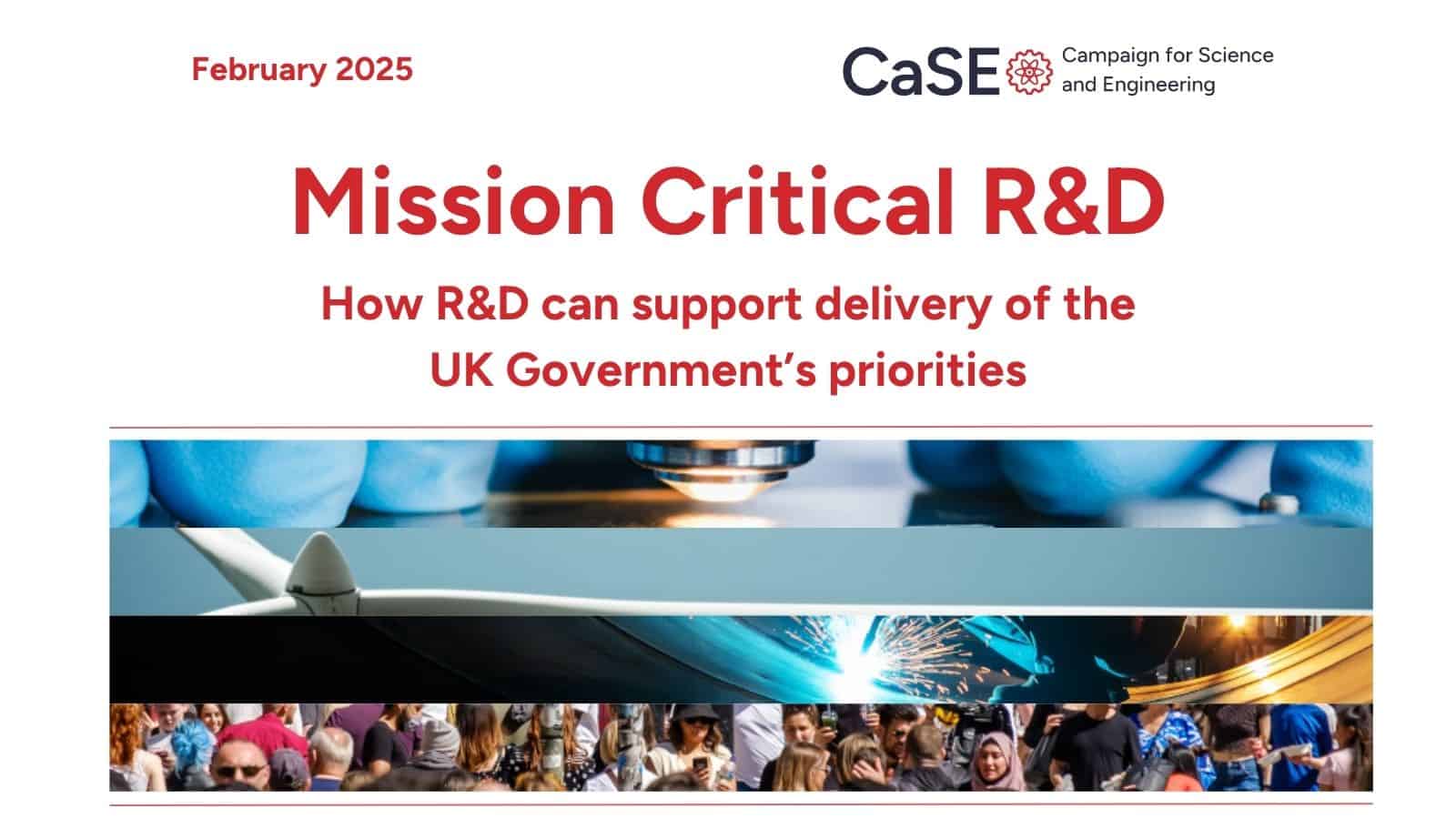Recommendations for Government
Despite the strength and promise of UK R&D to deliver the missions, the R&D sector faces challenges. We propose a range of solutions that will help to address these.
Commit to a long-term plan for R&D
A predictable policy environment is vital to enable effective long-term planning and investment in R&D by businesses, universities and others in the sector.
- There needs to be cross-Government coordination on long-term plans and high level goals to ensure coherence and consistency, with leadership from the very top of Government. This can be done through the Science and Technology Cabinet Committee and Mission Boards.
- The UK Government should work with the R&D sector to develop 10-year budgets for key R&D activities as part of a wider strategic framework for R&D. These should:
- Strike the right balance between stability versus flexibility
- Introduce an exit point and strategy
- Consider the added value and benefit when directing long-term funding
- Consider the realistic timeframe on returns
- Ensure transparency and clear communication around parameters
Maintain a broad and balanced R&D base
The interdisciplinary nature of the complex societal challenges that the missions hope to address means they will need to be informed by a range of R&D disciplines. In addition to applied R&D, it is important not to lose sight of the vital role of broad, discovery research in supporting the missions.
- The UK Government must continue to support a breadth and diversity of disciplinary strengths in R&D. This should include ensuring a diversity of funding sources and types, both within UKRI and from other parts of Government.
- The UK Government should address the decline in the value of QR funding in England and ensure that QR funding is uplifted in line with new R&D commitments. The Scottish and Welsh Governments should also ensure that Scottish and Welsh universities have access to the flexible funding they need to support discovery research.
Fix the fundamentals of the R&D system
The sustainability of the R&D system is vital to the future success of R&D in the UK. This includes financial sustainability, as well as the people and skills that underpin it.
- Take short-term action to support universities while longer-term reform is carried out. A holistic review of the funding mechanisms for university-led R&D (and universities more broadly) is needed to increase ‘end-to-end’ coverage of the costs of research activity and protect the UK’s world leading research sector.
- The UK Government should immediately reduce upfront visa costs for researchers and associated roles. Any changes to visa routes need to make them simpler for individuals and businesses to navigate and should consider how to attract talent across all of R&D.
Invest in regional capacity building for R&D
For a region to benefit from R&D investment it needs to have capacity to carry out R&D.
- Conduct a comprehensive mapping of the R&D infrastructure landscape to identify any gaps and encourage and assist wider access to research and innovation infrastructure. This should include UKRI keeping infrastructure databases up to date across specific sectors.
- Design large scale inter-regional collaboration into national strategic planning and funding calls.
- Funding agencies should work with local government and mayoral authorities to provide continuous stewardship of regional R&D programmes and innovation initiatives, even once a programme ends.
Drive adoption and uptake of innovation
For R&D to contribute to the missions, it is necessary to support translation and commercialisation into innovation as well as uptake and diffusion across public services.
- Consider how access to scale-up infrastructure could be subsidised or develop ways of bringing in joint funding with industry to reduce the upfront cost for R&D intensive scale-ups.
- Support non-traditional routes into R&D jobs alongside PhD training, including for example apprenticeships and bootcamp style training opportunities. The Entrepreneurs in Residence programme is an example of a programme of learning by teaching that has been helpful in bringing in role models and is highly replicable across sectors.
Recommendations for the R&D sector
Although a majority of the public think the Government should use R&D as a tool to achieve its missions, it is not completely clear to people how investing in R&D can help achieve these goals. The following actions should be taken by the R&D sector to better communicate to policymakers and the public how R&D can help tackle society’s problems and help the Government achieve its ambitions.
Emphasise both the short-term and long-term benefits of R&D to policymakers
Impact from R&D can involve small, incremental improvements over a long period. This can lead to unrealistic expectations from government about the time taken between specific R&D investment announcements and seeing a return on that investment.
- The R&D sector should clearly communicate any immediate benefits, as well as the longer-term benefits, of R&D to demonstrate the value of sustained investment. This could include the use of mission-aligned case studies, framed in ways which emphasise and quantify the investment that led to the stated impact.
Articulate to policymakers how existing, interdisciplinary R&D supports the missions
In addition to funding new research in support of the missions, the UK’s existing R&D knowledge base is a valuable resource that, if supported, can be readily deployed by the UK Government to achieve rapid mission progress.
- R&D institutions across the UK should coordinate with government Chief Scientific Advisers and collaborate both internally and externally to synthesise and translate their research in a way that is accessible to political audiences.
Highlight the diversity of R&D that supports the missions at a local level
The diversity of mission-applicable R&D taking place across the UK must be made more visible to different audiences, both public and political.
- Those seeking to raise the profile of R&D should highlight the breadth of research activity being conducted in their local area, by opening up their establishment’s doors and going out into local communities.
- R&D advocates from all disciplines should foreground the place and purpose of their work, as effective ways to convey the value of R&D to both political and public audiences.
Champion diverse voices and messengers from the R&D sector
There is a need to highlight the diversity of roles and people working in R&D, and to champion these voices as advocates for the value of R&D to society and to the UK Government’s missions.
- R&D institutions, universities, funders and local organisations should champion excellence and diversity in R&D when engaging with the public. This must include establishing mechanisms to ensure that those who act as local R&D messengers or advocates are adequately incentivised and recognised for their valuable engagement work.
Embed and innovate ways of involving and engaging the public with mission-led R&D
R&D stakeholders should explore creative ways to involve and engage with the public on R&D, including in underserved communities who may mistrust R&D activities.
- R&D organisations should consider how they could adopt the People’s Principles for Involvement in R&D into their own work, as a step towards meaningfully and purposefully involving the public in R&D.
Report Authors

Dr Camilla d'Angelo
Policy Manager

Dr Florence Young
Public Opinion and Policy Officer





